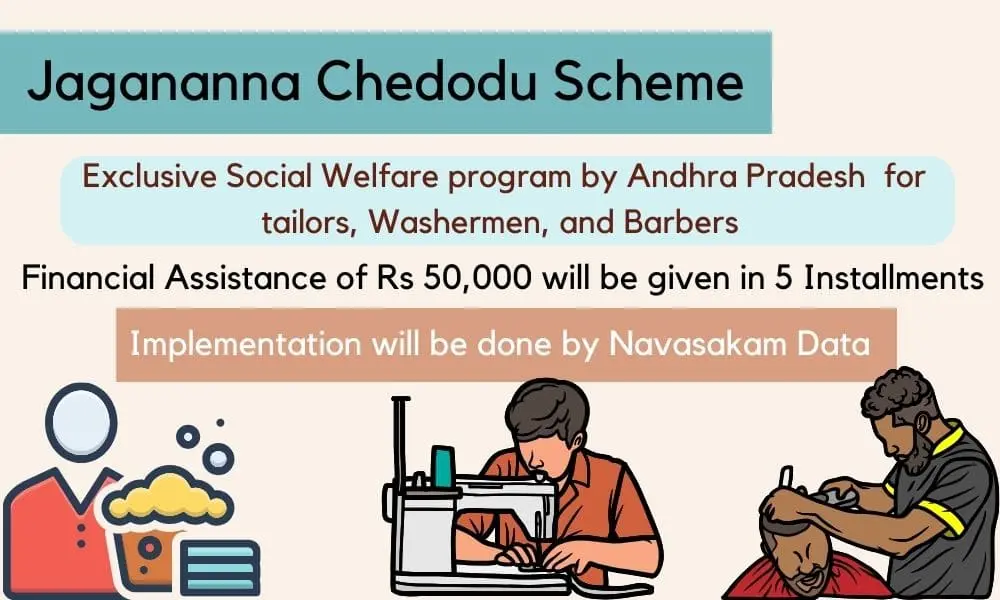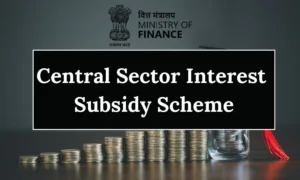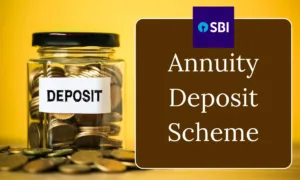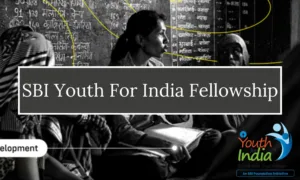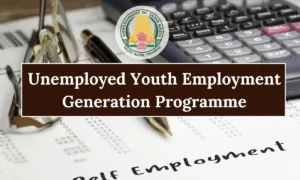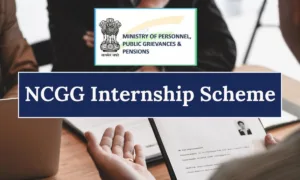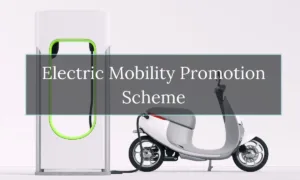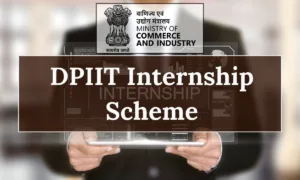In a historic achievement, Chief Minister YS Jagan Mohan Reddy reached a significant milestone by disbursing an impressive amount of Rs 325.02 crore directly into the bank accounts of 3,25,020 eligible recipients, which includes Rajakas, Nayee Brahmins, and Tailors, as part of the ‘Jagananna Chedodu’ scheme. This groundbreaking event unfolded in Yemmiganur, Kurnool district, on October 19, 2023. In this article, we are going to talk about the scheme that has transformed the lives of small businessmen with financial assistance of Rs 10,000 annually.
If you are also from Andhra Pradesh and want to start a business of your own among Rajakas, Nayee Brahmins, and Tailors, this scheme will help you achieve that. If you want to know more, read this article till the end.


What is Jagananna Chedodu Scheme ?
The Jagananna Chedodu scheme, initiated by the B.C. Welfare Department, Government of Andhra Pradesh, is an exclusive social welfare program tailored for tailors (across all communities), Rajakas (washermen), and Nayee Brahmins (Barbers) residing in the state. Under this scheme, eligible beneficiaries are entitled to receive a one-time sum of ₹10,000 per annum for a duration of five years, totaling ₹50,000 disbursed in five installments. This financial support is intended to empower beneficiaries by enabling them to procure necessary tools, equipment, and other essential resources to enhance their income-generating activities and establish their own businesses.
The scheme’s implementation is overseen by Welfare and Education Assistants or Ward Welfare and Development Secretaries at the Village/Ward secretariat level, while at the district level, the Executive Director of the BC Corporation takes charge, with support from MPDOs and Municipal Commissioners.
| Jagananna Chedodu Scheme 2023 Key Highlights | |
| Jagananna Chedodu Scheme Launch Date | June 10, 2020 |
| Jagananna Chedodu Scheme Official Website | Click Here |
| Jagananna Chedodu Scheme Objective | To provide financial assistance to small businessmen so that they can buy necessary tools for their business |
| Jagananna Chedodu Scheme Department | B.C. Welfare Department |
| Jagananna Chedodu Scheme Beneficiaries | Tailors (across all communities), Rajakas (washermen), and Nayee Brahmins (Barbers) |
| Jagananna Chedodu Scheme Benefit Amount | Rs 10,000 every year for a total of 5 Years amounting to a total of Rs 50,000 |
| Jagananna Chedodu Scheme Budget | 3.25 Crore ( till October 2023) |
| Jagananna Chedodu Scheme No. of Beneficiaries | 3.25 Lakh ( till 2023) |
| Jagananna Chedodu Scheme No fo Installments | 5 |
| Jagananna Chedodu Scheme Income Limit | Rs 2,50,000 |
| Jagananna Chedodu Scheme Helpline Number | 0866 247 9417 |
Jagananna Chedodu Scheme Objective
The prime objective of this scheme is to provide financial assistance to eligible beneficiaries so that they can start their own business. The eligible business of the scheme is Tailors (across all communities), Rajakas (washermen), and Nayee Brahmins (Barbers). The assistance of Rs 10,000 will be given annually for 5 years. This money will be used to buy all the necessary tools for their business to grow.
The government will identify the beneficiaries of the scheme by utilizing data from the Navasakam surveys. After this, the beneficiary will get the monetary support directly into their bank account.
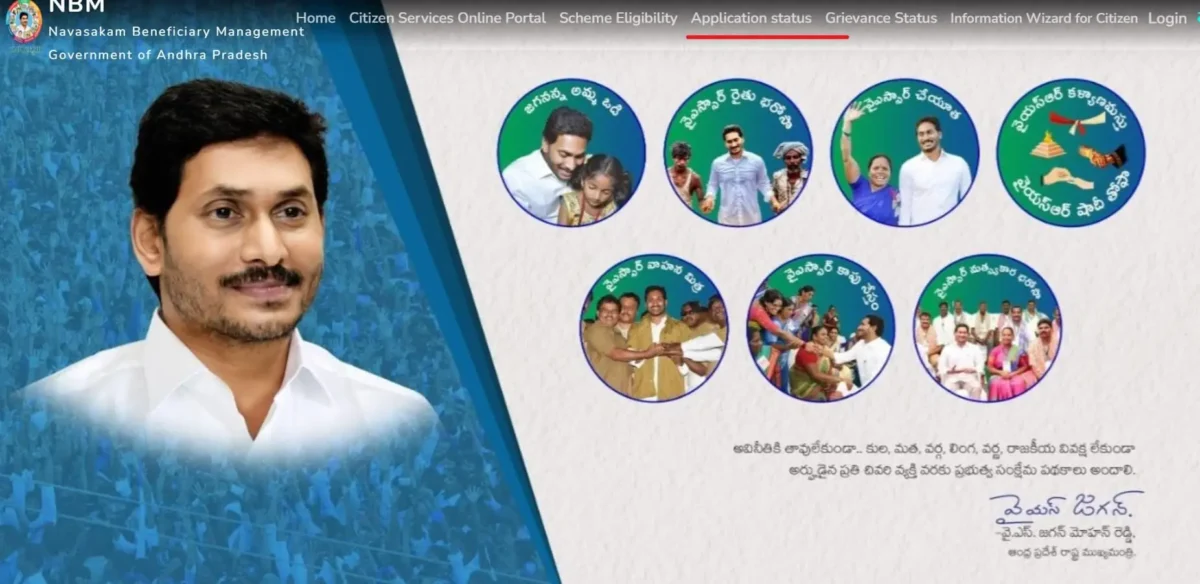
Jagananna Chedodu Scheme in News | What’s New?
On October 19, 2023, the CM of Andhra Pradesh distributed a total sum of 3.25 Cr for the 3,25,000 beneficiaries. This sum is the fourth installment of the scheme. This fresh fourth tranche of the ‘Jagananna Chedodu’ scheme has disbursed financial assistance as follows: Rs 180.66 crore has been allocated to 1,80,656 tailors, Rs 104.55 crore to 1,04,551 Rajakas, and Rs 39.81 crore to 39,813 Nayee Brahmins. Under this visionary program, eligible beneficiaries who own shops are entitled to receive Rs 10,000 annually. Notably, each beneficiary has received Rs 40,000 under the scheme over the course of the past four years, emphasizing the government’s continued support.
| Beneficiary Group | Amount Allocated (in Crores) | Number of Beneficiaries |
| Tailors | Rs 180.66 | 1,80,656 |
| Rajakas | Rs 104.55 | 1,04,551 |
| Nayee Brahmins | Rs 39.81 | 39,813 |
Jagananna Chedodu Scheme Eligibility Criteria
Here are the complete eligibility criteria that are available in a tabular format as well.
1. The total annual income of the applicant’s family must not exceed ₹2,50,000.
2. The applicant’s family landholding should be limited to wetland under 10 acres, dry land under 25 acres, or a combination of wetland and dry land under 25 acres.
3. No member of the applicant’s family should be employed by the government or receiving a government pension, except for families of sanitary workers who are exempt from this requirement.
4. Students must have secured admission in colleges, universities, or institutes offering regular courses such as B.Tech, B.Pharmacy, ITI, Polytechnic, B.Ed, M.Tech, M.Pharmacy, MBA, or other degree/PG courses. For PG courses, eligibility is limited to Government/University Colleges.
5. Students should be enrolled in institutions falling into the following categories: Government or Government-Aided, Private Colleges affiliated with State Universities/Boards, day scholar students, and students in College Attached Hostels (CAH) and Department Attached Hostels (DAH).
6. The applicant’s aggregate attendance should be at least 75%.
7. No family member should own a four-wheeler, although Taxis, Tractors, and Autos are exceptions.
8. The applicant’s family should not possess property exceeding 1500 sq. ft. of built-up area (whether residential or commercial) in urban areas.
9. No family member should be an income taxpayer.
10. Both male and female students are eligible, with age requirements varying depending on the specific prescribed courses.
11. Eligibility extends to students belonging to categories like SC, ST, BC, EBC (other than Kapu), Kapu, Minority, and Differently Abled.
Exemptions:
1. This scheme does not cover students enrolled in private and deemed universities, except those admitted through the Government Quota.
2. Students pursuing distance learning or correspondence courses are not eligible for this scheme.
3. Students belonging to management and NRI quotas are also excluded from this scheme.
You can also check your eligibility by visiting the official website of Andhra Pradesh :

Jagananna Chedodu Scheme Eligibility Criteria 2023
| Criteria | Conditions |
| Total Family Income | The total family annual income is less than or equal to Rs. 2.50 lakhs. |
| Total family Land-holding | Beneficiaries should only have the wetland below 10 acres/ dry land below 25 acres/ or wetland and dry land under 25 acres. |
| Government Employee/ Pensioner | No family member should be a government employee or Government pensioner. The families of Sanitary workers are exempted. |
| Course Completion | The students must have availed admission in the colleges/universities or institutes recognized in regular courses. |
| Eligibility Courses | B.Tech, B.Pharmacy,ITI, Polytechnic,B.Ed,M.Tech,M.Pharmacy, MBA,Other Degree/PG Courses* For PG Courses only Government/University Colleges are eligible. |
| Institution | The students enrolled in the following institutions are eligible:Government or Government AidedPrivate Colleges affiliated to State Universities / Boards.Day scholar students, students in College Attached Hostels (CAH) and Department Attached Hostels (DAH) |
| Attendance | Aggregate attendance should be 75% |
| List of Documents Required | Aadhaar CardRice Card / Income certificateCollege admission particularsParents detailsDeclaration of No Government Employee / PensionerNon-taxpayer declaration / No Four-Wheeler / No Urban Property beyond 1500 Square feet / No agriculture land beyond the prescribed limit |
| Four-wheeler | No member of the family should own a four-wheeler (Taxies / Tractors/ Autos are exempted) |
| Municipal Landholding | A family who owns no property or less than 1500 sq. ft. of built-up area (Residential or Commercial) in urban areas is eligible |
| Income Tax | No family member should be an income tax payee |
| Age & Gender | Both Male and female, Age should be depending on the Eligible of prescribed courses. |
| Caste & Category | Students belonging to SC, ST, BC, EBC (other than Kapu), Kapu, Minority, and Differently Abled categories are eligible. |
| Ineligibility | This scheme is not applicable to deemed and private varsities (Except for Government Quota).The scheme is not applicable to students studying through distance learning and correspondence courses.This scheme is not applicable to the students belonging to management and NRI quotas |
Jagananna Chedodu Scheme Application Procedure:
Here is the complete Online Application Process for the Jagananna Chedodu Scheme.
Step 1: Begin the application process by visiting the Citizen Schemes Portal landing page. Log in using Aadhaar-tagged mobile OTP authentication. On the “Citizen Scheme Application” page, choose “Jagananna Chedodu” from the list of schemes and click “Submit.”

Step 2: Applications submitted are then directed to Welfare and Education Assistants (WEA) or Ward Welfare and Development Secretaries (WWDS).
Step 3: Volunteers, WEAs, or WWDS personnel conduct field verifications for each application. This involves eKYC procedures and making suitable recommendations, which are then forwarded to the Mandal Parishad Development Officer (MPDO) or Municipal Commissioner (MC).
Step 4: The MPDO/MC reviews the application and provides appropriate recommendations, subsequently forwarding the application to the Executive Directors of the Backward Classes Welfare Department (ED BC).
Step 5: The Executive Director of the Backward Classes Corporations (ED BCs) verifies the application and offers pertinent recommendations.
Step 6: Based on the recommendations from the ED BCs and applicant eligibility criteria, the Social Audit generates two lists: the Provisional eligible list and the Reverification list (with reasons for ineligibility). These lists are made available at all secretariats.
Step 7: Citizens included in the Reverification list have the option to raise grievances if they believe the stated reason for ineligibility is incorrect.
Step 8: The final list of eligible and ineligible beneficiaries is published in all secretariats.
Step 9: If a citizen is mentioned in the Final Ineligible list and believes the reason for rejection is incorrect, they can raise a grievance through the Citizen Schemes Portal.
Step 10: The benefits of the scheme are disbursed to eligible beneficiaries through the Aadhaar Enabled Payment System (AEPS). Beneficiaries acknowledge receipt of the payment through eKYC (Biometric Authentication) conducted by Volunteers, WEAs, or WWDS.
Step 11: Beneficiaries can monitor the status of their payment by visiting the Citizen Schemes Portal landing page and selecting “Track Application Status.”
Jagananna Chedodu Scheme Necessary Documentation
1. Aadhaar Card
2. Rice Card or Income Certificate
3. College Admission Details
4. Parental Information
5. Declaration of Non-Government Employment or Pensioner Status
6. Declaration of Non-Taxpayer Status, No Ownership of a Four-Wheeler, No Urban Property Exceeding 1500 Square Feet, and No Agricultural Land Beyond the Specified Limit.
Jagananna Chedodu Scheme Implementation
The government will identify and select beneficiaries for the Jagananna Chedodu scheme by utilizing data from the Navasakam surveys, which are conducted by ward or village volunteers throughout the state. These volunteers will compile a list of eligible applicants, which will then be reviewed by the ward and village secretaries. Following this, a social audit will be conducted to make the final selection of beneficiaries.
The confirmed list of beneficiaries will be made available to the public through the ward secretariat. The designated benefit amount will be transferred directly to the bank accounts of the eligible beneficiaries using the Direct Benefit Transfer (DBT) system. In the event that an eligible beneficiary’s name is not on the list, they can contact the ward secretariat for assistance.
Jagananna Chedodu Scheme Track Application Status
In order to track whether your application has been approved or not. You need to visit the official website that is meant to provide the same information. Here is the step-by-step process of tracking the application status of the Jagananna Chedodu Scheme.
Visit the official website of NBM, Andhra Pradesh
After that, look for the “Application Status” and “click” on that
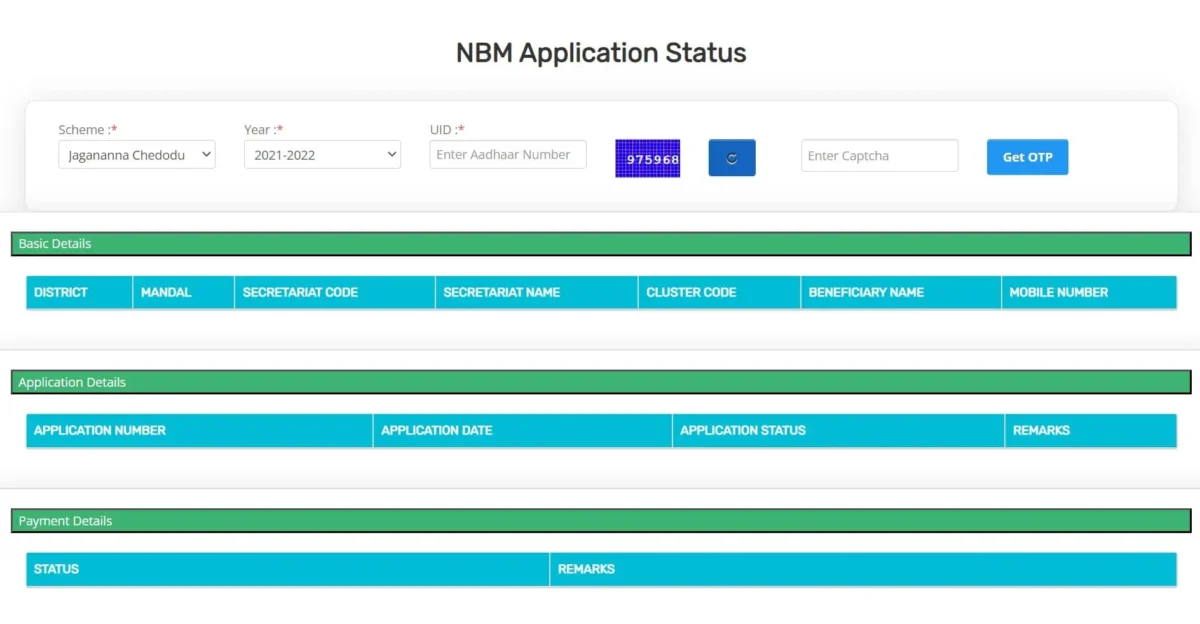
A new page will be displayed on the screen
Now, you need to enter the “scheme name”, scheme year, and your “Aadhar Card” to check the status.
You will be able to check the application status after submitting the captcha.
DOWNLOAD THE “JAGANANNA CHEDODU SCHEME” GUIDELINES [PDF]
Jagananna Chedodu Scheme FAQs
What is Jagananna Chedodu Scheme?
The Jagananna Chedodu scheme is an exclusive social welfare program tailored for tailors (across all communities), Rajakas (washermen), and Nayee Brahmins (Barbers) residing in the state. Under this scheme, eligible beneficiaries are entitled to receive a one-time sum of ₹10,000 per annum for a duration of five years, totaling ₹50,000 disbursed in five installments.
What is the minimum income limit under the Jagananna Chedodu Scheme?
The minimum income limit under the Jagananna Chedodu Scheme is Rs 2.5 lakh.
Is there any age limit for the Jagananna Chedodu Scheme?
Under this scheme, Age should be depending on the Eligible of prescribed courses
What should be the minimum attendance under the Jagananna Chedodu Scheme?
The applicant is required to have a cumulative attendance of 75% under this scheme.
Is it possible for students from the General/Unreserved category to apply?
No, eligibility is restricted to students falling within categories such as SC, ST, BC, EBC (other than Kapu), Kapu, Minority, and Differently Abled.
What are the documents required for the Jagananna Chedodu scheme?
To apply for this scheme, you will be required to provide the following documents:
1. Aadhaar Card
2. Rice Card or Income Certificate
3. College admission details
4. Information about your parents
5. A declaration confirming that neither you nor your parents are government employees or pensioners
6. A declaration indicating that you are not a taxpayer, do not own a four-wheeler, do not possess urban property exceeding 1500 square feet, and do not own agriculture land beyond the specified limit.
ALSO READ:
Telangana CM Breakfast Scheme 2023 Rolled Out for Class 1 to 10, 20 Lakh Students
Tamil Nadu CM Breakfast Scheme 2023 | Now Extended to 15.75 Lakh Students
